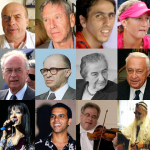Israeli angels – Vayyetzei
 Leaving Laban behind in Mesopotamia, Jacob was met by the angels of God, and he said, “This is God’s camp”.
Leaving Laban behind in Mesopotamia, Jacob was met by the angels of God, and he said, “This is God’s camp”.
But why did he use a plural (or rather dual) name, Machanayim, “Two camps” (Gen. 32:3)?
The sages answer that one camp of angels accompanied him to the border of Eretz Yisrael and then a camp of Israel-based angels took over.
Jewish experience in the Diaspora is not identical with that in Israel. Despite David Ben Gurion’s arguments to the contrary, one can live a Jewish life outside Israel; the Diaspora experience has its successes and the Israeli experience its failures.
But being Jewish in Israel is more natural and less ambiguous than elsewhere. There is a special sense of fulfillment in living as a Jew on the ancestral soil.
But the way Israeli society has developed there seem to be, in their own way, two camps. The religious live their life and the secular theirs.
In some places there is mutual respect, especially in Tzahal (the Israeli Defence Force). But it makes you weep to see self-centred religious circles who have basically given up on those who do not share their spiritual certainty, and to see secularists who know nothing of the spiritual treasury of the Jewish heritage, but look at the denunciatory face of some charedim, and say, “If this is religion, I want none of it”.
Precisely because we in the Diaspora learn to acknowledge Jewish diversity in unity, and unity in diversity, we can foster in Israel ideas such as sitting together, talking together, and introducing Jews of all commitments to Jewish learning and experience.
If they could reach out with love and respect to the secularists, the religious might sell more of their product: and if the secularists could see and taste more, they might find unbelievable inspiration.



